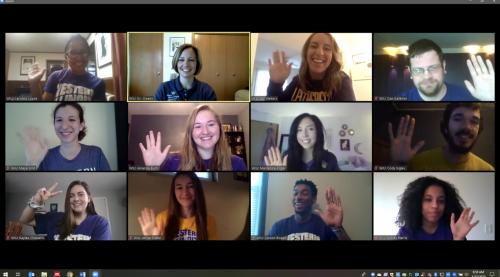WIU RPTA Course Moves 'Camp Rocky' to Virtual Format Over the Weekend
April 27, 2020

Students in WIU Assistant Professor Megan Owens' RPTA class transitioned from planning and delivering an in-person youth camp to a virtual camp this weekend.
[Download Print-Quality Image]
Editor's Note: This is the fourth in a series of feature stories about Western Illinois University faculty who are adapting and finding unique ways to reach their students during the COVID-19 Pandemic.
MACOMB, IL – As spring begins and activities move outdoors, a class at Western Illinois University traditionally plans a weekend camp for area children. Because of COVID-19, and in-person classes at WIU moving to alternative formats, the Recreation, Park and Tourism Administration class, taught by Assistant Professor Megan Owens, transitioned to an online camp experience called Virtual Camp Rocky.
The camp, which was held online Saturday, was for students in grades 1-8, and was conducted using Zoom technology.
"There are several reasons I didn't just cancel the Camp Rocky program and lecture on camp planning techniques," said Owens. "First, I want the students to understand that life is not stagnant and our field needs to adjust to the needs of our customers. I want my students heading out on their camp and youth program internships this summer to be prepared to provide a quality program experience regardless of setting and circumstance."
The free, virtual camp involved all of the students in Owens' RPTA 340 class. Students led small group activities and, prior to the start of the camp, created video tutorials with general lessons, and making crafts and snacks, which were posted on the Camp Rocky webpage. Videos included how to make trail mix, Origami activities and how to make a journal.
The traditional classroom course is designed for maximum experiential learning, where Owens said students normally tackle situations relevant to the youth camp field, such as business planning, marketing initiatives and designing a program to address the needs and interests of youth. Prior to the course delivery switch, students had already divided into committees addressing fundraising, marketing, hospitality and programming. Other students held leadership positions, such as the director and assistant director of the camp.
"The course design intentionally mimics an actual camp organization," said Owens. "The scattering of everyone, and stay at home orders, changed many aspects of the class, but it provided a wonderful opportunity for the students to learn what it means to adjust and be flexible in their work. Instead of simply cancelling Camp Rocky, I decided to use this pandemic as a giant teachable moment."
WIU junior RPTA major Maya Smit, of Geneseo, IL, said the Camp Rocky program was unlike it has ever been in the past.
"It was quite a unique situation to be put in, but I am so happy with the results," she said. "Hearing that the campers that were in the program enjoyed it made all of the hard work while adjusting to the transition worth it. I am so happy that we were able to put on the program that we did, and I'm glad that it was a positive experience that we were able to put on for the youth of Macomb."
By transitioning the class online, Owens said her hope was to reach students who might not normally have participated. The change also gave students the chance to use all of the skills they have enhanced over the semester, but to see them play out in a different format with a new marketing strategy and program plan.
Throughout the pandemic, students have met virtually, outside of class time, to finish their work. Owens said she helped guide students through conversations to help them understand they were capable of operating the camp in a new format.
"The students have felt a range of emotions, uncertainty, sadness for losing out on the full, in-person experience, and then excitement when they realized what they could do for the virtual Camp Rocky program," she said. "I checked in with them often and provided a new structure of assignments that would aid their planning and implementation process. Once the new structure was in place, they were off and running. There is still some nervousness, but much more excitement around the experience they created for local youth."
Owens said the altered class delivery method has taught her to take chances with her classes and to trust the potential she sees in her students.
"Additionally, I believe it's important that my course content is relative to the career fields my students will be entering. Several of my students in this particular class will be completing an internship with a summer camp program (fingers crossed here)," she said.
Owens said she has been inspired by a camp professional, who created a group where recreational professionals could contribute and discuss ways to move camp programs to virtual formats. She said camp professionals worldwide are making decisions regarding summer operations and session length and the class experience at WIU will help her students prepare for whatever comes next.
"There is a sub-set of camp professionals that are currently making the shift from a traditional in-person camp to providing a virtual camp," she said "My intention with this course project (Camp Rocky) pivot, is to help my students learn new skills that they can use during their internships….even telling their internship organization 'Hey I could help you lead a virtual camp, I just did that.' Through all of these conversations, I believe that my class' experience will set them up for a flexible and adaptable career in the camp or youth program fields."
For more information about the RPTA program at WIU, visit wiu.edu/RPTA. For more information about the camp, or to see the students' videos, visit bit.ly/2zyhT4F or the camp's Facebook page at facebook.com/camprocky.
Posted By: Jodi Pospeschil (JK-Pospeschil@wiu.edu)
Office of University Communications & Marketing

Connect with us: